Have you noticed your child reacts to hot and cold temperature food or drink? Most children will say their teeth “hurt,” however if it is while they are eating or drinking something hot or cold, this is most likely tooth sensitivity. While it is not uncommon for children to express tooth sensitivity to hot and cold, it is something that should be discussed with their pediatric dentist.
Reasons for Tooth Sensitivity in Children
Primary teeth, or baby teeth, have thinner enamel than that of permanent teeth. This thinner layer of enamel means less protection between extreme temperatures and the nerve endings of the teeth. Some teeth, however, like molars, can develop with “softer” enamel and, as a result, are more sensitive to temperature changes than other teeth.
Because the amount of enamel on the teeth is responsible for sensitivity to temperatures, proper dental hygiene is crucial. The most common reasons children experience tooth sensitivity are:
- Improper brushing habits: not brushing enough or brushing too hard
- Cavities: tooth decay exposing nerves
- Cracked or broken tooth: exposed nerves
- Loose filling: exposed nerves
- Sinus infection: upper teeth sensitivity due to sinuses pressing down
Treating My Child’s Tooth Sensitivity
The first step to helping your child with teeth sensitive to hot and cold is talking to their pediatric dentist. The dentist will be able to determine the cause for the sensitivity and how to proceed in treating it. If your child is facing tooth sensitivity due to worn enamel or cavities, it’s important to stress proper dental hygiene with your child. They should be brushing correctly, twice daily for two minutes. They should also be flossing every day. Your pediatric dentist may also recommend fluoride treatments to help strengthen tooth enamel.
If you have more questions about your child’s tooth sensitivity, contact Charlotte Pediatric Dentistry.








